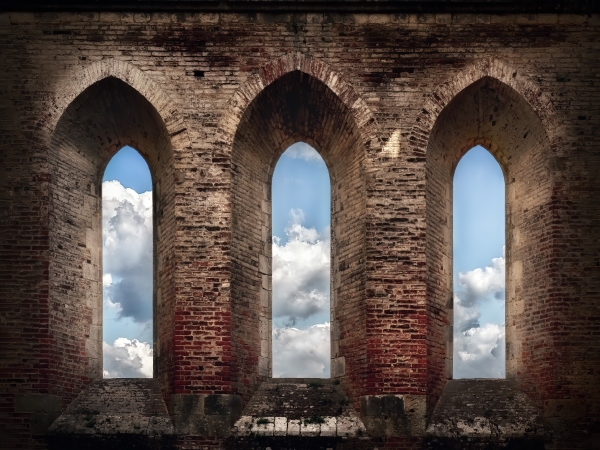Where God Prepares the Table

Proper 21, 19th Sunday after Pentecost
Sermon by the Rev. Matthew David Morris
When I look at these readings I see conflict.
I see conflict in the way that the softness and gentleness of Psalm 23, and the encouragement and faithfulness of Philippians 4 clash with the somewhat problematic parable of the Wedding Feast, wherein Jesus compares the Kingdom of God to a King who, in short succession, throws a party, destroys a city of people, and casts a guest into the outer darkness for not wearing the right outfit.
There is conflict here.
And I'm also conflicted on a personal level because this is my last Sunday with you. This is the last sermon I'll preach at All Saints, and a part of me would like this last sermon to be soft and gentle like the psalmist, and encouraging of your faithfulness as Paul does to his beloved friends in Philippi. But Jesus, being God, throws a wrench in the wheel and prevents me from making a smooth and simple exit.
This decision––to either contend with the complexity and consternation of Jesus or to cherry-pick Scripture to suit our longing for a simpler life––is one that does not belong solely to the preacher, but to every Christian who considers their faith to be something of consequence.
If church is little more than a social club, than the imperatives which Jesus delivers to his followers––then and now––can be deemphasized and the focus of church can shift to the decorative pastiche of satin runners and patchwork frontals, well-arranged bouquets and perfectly performed rituals of beauty and order.
But Jesus is a troublemaker. I'm not so sure he would have been a good, mid-century Episcopalian.
As the priest in this place, ironically, I'm perhaps the one most subject to the temptation to ignore Jesus––Jesus, the parable giver––in favor of a Jesus-like archetype whose role is, primarily, to sanction our social mores. In other words, I've been wrestling with the temptation to leave out the troubling Jesus and to leave you with a one-note sermon that says, in short, everything will be fine when we can just get back to the building and go back to normal.
But the present moment is a moment of unavoidable conflict. That is my starting point for this sermon, and that is our shared starting point as a society today.
So in response to this conflict, I'm going to take a cue from Jesus and paint you a picture of something that does not yet exist; something that could very well take shape, with enough people's buy in and, of course, with God's help.
Imagine for a moment that All Saints Episcopal Church is not a church with a long history; a church with the memory of generations of parish hall gatherings and sanctuary celebrations. Imagine that you never saw the sight of the flowers lining the front railing at Easter, or the Christmas pageants or any of what's been created in this building before this present moment. Imagine that All Saints wasn't the sum total of all those past things.
Imagine instead that All Saints Episcopal Church was the newest church plant in the Diocese of Oregon. A church plant with a huge leg up. A church plant that inherited from the church that came before it: a building with beautiful landscaping; a thrift store, an industrial kitchen, and a pocket park; classrooms and fine linens and stained glass. A whole bunch of good stuff. Some of it worth holding onto, some of it worth letting go, and some of it essential to throwing the kind of feast where God prepares the table.
Imagine that this church plant was filled with a ragtag group of people––some of means and some dirt poor; some with degrees and some with calluses on their hands; and all of them invested in one thing:
Discerning the work that God is already doing in the world and committing to participate in that work together.
That's it. That's the vision.
This church plant is not hindered by anything because it isn't attached to anything except the commitment to discerning God's call in community together.
It's not attached to the building or the landscaping. It's not attached to the thrift store or to the Pocket Park. It's not attached to the industrial kitchen. It's not attached to the classrooms or the linens or the stained glass. It's not attached to any of it. Especially to the sense that having those things is in any way at the heart of what it means to follow Jesus.
It's a church plant, remember. All those things are extra.
The only thing that's essential in the new All Saints church plant is the commitment to discerning God's call in community together.
What kinds of wonderfully creative things might this church plant do? What would the ministry of the people look like if the people saw everything they inherited in this building as simply a collection of tools to use in the furthering of God's mission of transforming the world through God’s liberating, life-giving, & reconciling love?
Can you imagine?
This vision of an All Saints church plant is just one response that a follower of Jesus might have to the conflicts we see in scripture and in the world today. But I think it’s a good one. And here's why.
In response to the conflicts Jesus sees in his day––the conflicts of a people whose idolatry is disguised as piety––Jesus, time and time again, paints an imaginative vision that helps to shock folks out of their slumber and remind them of who God really is.
The Lord is our shepherd. There is comfort in this truth, but there is also a challenge to the notion that we are perfectly capable of shepherding ourselves, thank you very much.
No, God is our shepherd. Not the priest or the deacon. Not the Vestry or the Committee Chairs. Not even the bishop.
No, God.
And not God the King who punishes. That’s who we’re inclined to be.
The King of this parable is not God. The King is the comfortable Christian whose offers of generosity are conditional and whose concerns about etiquette trump their willingness to be generous hosts.
The parable isn't the blueprint; it's the corrective. It's not showing us how to throw a feast; who to invite, who to throw out. It's showing us the mistakes we make when we govern over what God has given us to steward––like this building––as though it is our kingdom.
The party is not our to host. The party is God's. The One whose abundance sustains our very lives.The One to whom this building and everything in it belongs.
It doesn't belong to us. And it never has.
So "Rejoice!" Paul the church planter says. "Rejoice!" Rejoice because God is God and we are not. Rejoice because Jesus continues to make good trouble. Rejoice because the Holy Spirit is willing and able to convert the heart of even the most stubborn priest and to plant new churches in old buildings.
God is at work right now in the conflict of the present moment. So let us commit the fullness of our lives––our time, treasure and talent––to the holy work of discerning God's call in community together.
Amen.
Photo by Simon Berger on Unsplash
Tags: Sermons
